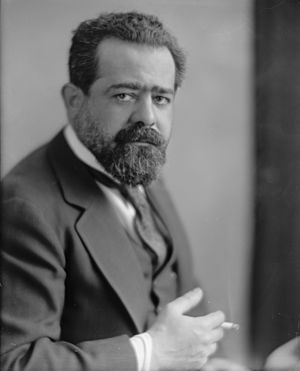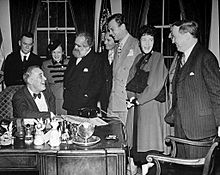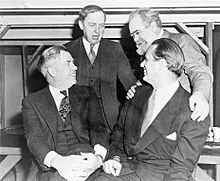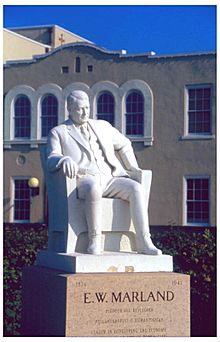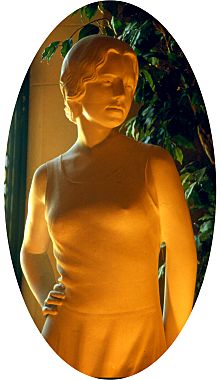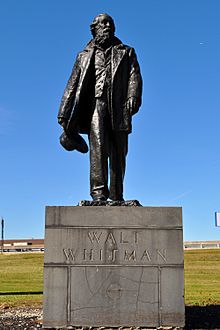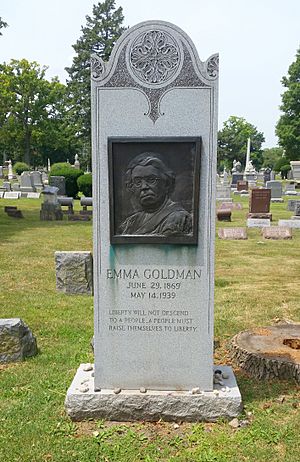Jo Davidson facts for kids
Jo Davidson (born March 30, 1883 – died January 2, 1952) was a famous American sculptor. He was known for making very lifelike statues, especially busts (sculptures of a person's head and shoulders). What made his work special was that he didn't ask people to sit still for him. Instead, he would watch them and talk to them to capture their true personality. He often started with clay, then his sculptures were made into terra-cotta (a type of baked clay), bronze, or carved from marble.
Contents
Early Life and Training
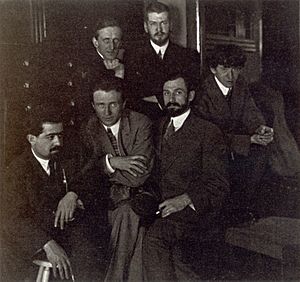
Jo Davidson was born in New York City. He grew up there and later began working in the studio of another American sculptor, Hermon Atkins MacNeil. In 1907, Davidson moved to Paris, France. There, he continued his studies in sculpture at the famous Ecole des Beaux-Arts.
A Career in Art
Early Success and Recognition
After returning to the United States, Jo Davidson became friends with Gertrude Vanderbilt Whitney. She was an important art patron and bought some of his early works. In 1911, Davidson had his first solo art shows. This was a big step for his career.
In 1927, an oilman named E. W. Marland invited Davidson to join a competition. Marland wanted a statue called Pioneer Woman for Ponca City, Oklahoma. Davidson and eleven other sculptors were paid to create small models. These models were shown in major cities across the U.S. Davidson's design did not win the final commission.
Awards and Exhibitions
Jo Davidson received several important awards for his art. In 1934, he won the Maynard Prize from the National Academy of Design. He was later elected as an Associate Academician of the National Academy of Design in 1944.
In 1947, the American Academy of Arts and Letters held a special show of his work. This show, called a retrospective, featured almost 200 of his sculptures. In the summer of 1949, Davidson was one of 250 sculptors. They showed their art at the 3rd Sculpture International at the Philadelphia Museum of Art.
Notable Art Commissions
Davidson received many important commissions throughout his career. He designed a badge for the United States War Industries. He also created sculptures for the Government of France to celebrate a victory of the Troupes de Marine.
Some of his most famous works are bronze busts of leaders from the First World War Allies. His sculptures of world leaders and famous people brought him international fame. He also created statues of oilman and future governor E. W. Marland and his two adopted adult children.
Involvement in Politics
Beyond his art, Jo Davidson was also involved in politics. He was the chairman of the Independent Citizens Committee of the Arts, Sciences and Professions (ICCASP). This group supported the policies of President Franklin D. Roosevelt and his re-election.
In 1946, ICCASP joined with another group to form the Progressive Citizens of America (PCA). Davidson became a co-chairman of this new group. The PCA worked to promote racial equality, economic fairness, and civil liberties. They believed in protecting the rights of all people.
Some members of the PCA later supported Henry A. Wallace when he ran for U.S. President in 1948. He ran as a candidate for the Progressive Party.
Famous Sculptures and Commissions
Jo Davidson created sculptures of many important and famous people. Here are some of the individuals he sculpted:
- Manuel Azaña
- Julio Álvarez del Vayo
- James Barrie
- Nicholas Murray Butler
- Charlie Chaplin
- Madame Chiang Kai-shek
- Joseph Conrad
- Émile Coué
- Clarence Darrow
- Charles G. Dawes - a bust for the United States Senate Vice Presidential Bust Collection
- Arthur Conan Doyle
- Albert Einstein
- Dwight D. Eisenhower
- Marshal Ferdinand Foch
- Anatole France
- Mahatma Gandhi
- André Gide
- Emma Goldman
- W. Averell Harriman
- Frank Harris
- Dolores Ibárruri (La Pasionaria)
- Robinson Jeffers
- James Joyce
- Otto Kahn
- Helen Keller
- Rudyard Kipling
- Robert M. La Follette, for National Statuary Hall in the United States Capitol
- D. H. Lawrence
- Edward Drummond Libbey, founder of the Libbey Glass Company and the Toledo Museum of Art
- Henry Luce
- John Marin
- E. W. Marland
- Lydie Marland and her brother George Roberts Marland
- Lowell Mellett
- Andrew Mellon
- Constancia de la Mora
- General John J. Pershing
- John D. Rockefeller
- Will Rogers (after his death) - statues at the Will Rogers Memorial Hospital and in National Statuary Hall
- Franklin Delano Roosevelt - installed at the Franklin D. Roosevelt Four Freedoms Park
- Ida Rubinstein
- Carl Sandburg
- E. W. Scripps
- George Bernard Shaw
- Lincoln Steffens
- Gertrude Stein
- Rabindranath Tagore
- Marshal Tito
- Getúlio Vargas
- H. G. Wells
- Henry A. Wallace - a bust for the United States Senate Vice Presidential Bust Collection
- Walt Whitman (after his death) - full-body bronze statues at the Walt Whitman Bridge in Philadelphia and in Bear Mountain State Park, New York
- Gertrude Vanderbilt Whitney
- Walt Whitman statue
- Evan Williams (Opera tenor)
- Woodrow Wilson
- Israel Zangwill
Where to See His Art
You can find Jo Davidson's sculptures in several important art collections. Some of his work is kept at the National Gallery of Art in Washington, D.C.
He also designed a statue of Henry D. Thoreau, the famous author of the book Walden. This statue is located at Walden Pond State Reservation in Concord, Massachusetts.
In 2006, the Smithsonian Institution's National Portrait Gallery opened a special exhibit. It's called "Jo Davidson: Biographer in Bronze." This exhibit permanently displays fourteen of Davidson's works in terra-cotta and bronze. It includes portraits of famous people like Gertrude Stein and Lincoln Steffens.
 | Bayard Rustin |
 | Jeannette Carter |
 | Jeremiah A. Brown |


